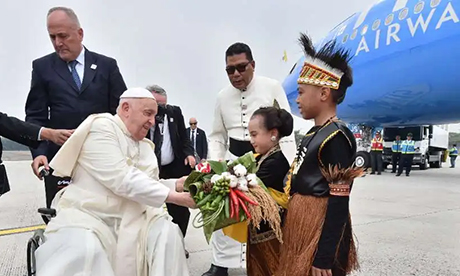Pope Francis’s visit to Indonesia is being hailed as a key moment for interfaith relations. He will engage with leaders from different religious communities in the world’s largest Muslim-majority nation.
The pontiff arrived in Jakarta on 3 September, marking the start of his 12-day trip across Asia and Oceania.
On 5 September, Pope Francis is expected to preside over a large interfaith gathering at Istiqlal Mosque, the largest mosque in Southeast Asia.
The mosque is located opposite Jakarta’s Cathedral of Our Lady of the Assumption. The two iconic sites are linked by a “fraternity tunnel” which symbolises religious unity and will be opened to the public after the pope’s visit.
Joy and enthusiasm
Indonesian Catholics and non-Catholics alike have welcomed the pope’s Indonesia visit with joy and enthusiasm.
Maria Jovita, a 21-year-old Catholic student, said the pope’s visit inspires young people. “The pope is not just the supreme leader of the Catholic Church but also an icon of global peace” she said.
“The papal visit emboldens the spirit of Catholic youth across Indonesia and also youths from other faiths” she told UCA News.
Muslim residents have also praised Pope Francis for his commitment to promoting peace and interfaith dialogue. Nabila Aprilia, a Muslim who plans to attend the interfaith meeting, said “I welcome the pope because his visit unites all religions in Indonesia”.
“I am glad he will visit the mosque, and Muslims feel proud of it” she added.
Yahya Cholil Staquf, the chairman of Indonesia’s largest liberal Muslim organisation Nahdatul Ulama, which has 80 million followers, was among those who welcomed Francis when he arrived at Soekarno–Hatta International Airport in Jakarta.
Cholil said the pope was welcome to “enjoy the country of unity, tolerance and brotherhood”.
Peace and brotherhood
Pope Francis’ Indonesia visit underscores his global appeal for harmony. He continues to advocate for peace in conflict regions such as Ukraine and the Middle East.
His prior efforts, including signing the 2019 Document on Human Fraternity with Sheikh Ahmed el-Tayeb, Grand Imam of Al-Azhar, are also recognised for fostering Christian-Muslim solidarity.
The Abu Dhabi Document is hailed as a Muslim-Christian manifesto for world peace and brotherhood based on religious harmony.
